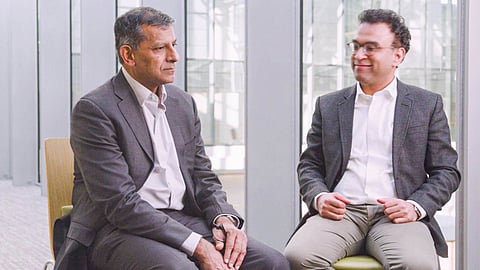Gig Economy, Startups, and Beyond: Raghuram Rajan on Reimagining India's Economy
The 17th edition of the Jaipur Literature Festival concluded with resounding success, hosting luminaries from various fields, including Raghuram Rajan, the former governor of the Reserve Bank of India and a distinguished economist. Rajan, alongside economist Rohit Lamba, unveiled their latest collaborative effort, "Breaking the Mould: Reimagining India's Economic Future," during the event. This groundbreaking book delves into India's economic landscape, shedding light on its growth trajectory, current challenges, and the imperative for reimagining its economic future.
Q: "Is your new book targeted solely at individuals with a background in economics, or is it accessible to a broader audience? What insights can a layperson gain from it?"
Raghuram Rajan: "This book is intended for anyone invested in India's future, fostering independent thought and stimulating constructive debates. We aim to raise awareness about the perils inherent in our current economic trajectory, advocating for a critical examination of our growth path. While addressing nuanced economic concepts, we have endeavored to make the content accessible to a wider audience. Additionally, the book has been translated into Tamil, further expanding its reach."
Q: "In your book, you advocate for breaking away from traditional economic paradigms. Could you elaborate on the implications of transitioning from a manufacturing-driven economy to one centered around services?"
Raghuram Rajan: "Our proposition entails exploring service-oriented industries as a catalyst for economic growth, offering an alternative approach to traditional manufacturing-centric models. It's crucial to note that we aren't advocating for a unilateral shift but rather advocating for diversification and innovation in our economic strategies. We must remain open to exploring new avenues for growth beyond conventional manufacturing sectors."
Q: "Given India's significant emphasis on engineering education and the abundance of engineering graduates, how do you envision the transition to a service-oriented economy impacting employment opportunities for these graduates?"
Raghuram Rajan: "The landscape of engineering education has evolved significantly, with a growing demand for engineering expertise across various service-oriented sectors. Engineering graduates are no longer limited to traditional manufacturing roles but are actively sought after in areas such as software development and technology integration (IT and ITES). The service sector presents diverse employment opportunities for engineering graduates, reflecting the evolving nature of the industry."
Rohit Lamba: "While there is a surplus of engineering graduates, the quality of education and industry readiness remain key challenges. Bridging the gap between academic learning and industry expectations is essential to maximize the potential of engineering graduates in a service-oriented economy."
Q: "The rise of the 'Gig Economy' has reshaped traditional employment dynamics. How do you perceive this shift and its implications for workforce stability?"
Raghuram Rajan: "The emergence of the 'Gig Economy' signifies a paradigm shift in employment practices, offering flexibility and autonomy to workers. While this model presents new opportunities, ensuring the financial security and welfare of 'Gig Economy' workers is paramount. Implementing measures such as unemployment insurance can provide a safety net for workers in times of uncertainty, fostering resilience and stability in the workforce."
Q: "What is the current landscape of startups in India, and how do you view their role in driving economic growth?"
Raghuram Rajan: "India's startup ecosystem has witnessed significant growth, with innovative ventures emerging across various sectors. Startups play a pivotal role in driving economic dynamism and job creation, offering disruptive solutions to existing challenges. The government's support is crucial in fostering a conducive environment for startup growth, enabling entrepreneurship to thrive and contribute to India's economic resurgence."
Rohit Lamba: "Embracing failure as a natural part of the entrepreneurial journey is imperative for fostering innovation and creativity in the startup ecosystem. By nurturing a culture of resilience and risk-taking, we can unlock the full potential of startups as engines of economic growth."
This piece is a translated and edited version of the original article published in the Ananda Vikatan issue dated 14/02/2024, interviewed by Srinivasan R. Click here to read the complete version.

